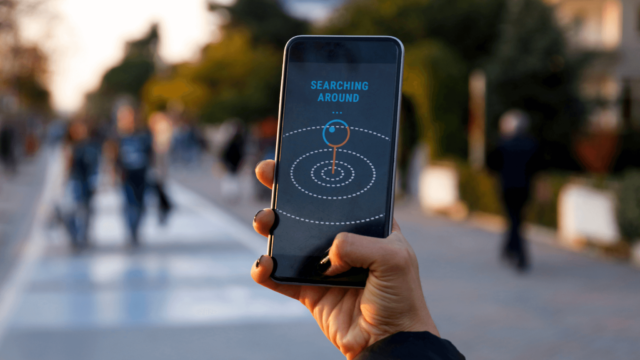Location-based mobile apps have revolutionized the way people use their smartphones. With the help of GPS technology, these solutions use location data to provide users with relevant and customized information. In this article, we will explore the different types of such apps and how they work.
Table of Contents
Types of Location-Based Mobile Apps
Navigation Solutions
These apps provide turn-by-turn directions to help users navigate their way through unfamiliar areas. Solutions like Google Maps and Waze use GPS technology to provide real-time traffic updates, alternative routes, and estimated arrival times.
Geotagging Solutions
These allow users to tag their location and share it with their friends and followers on social media. These apps such as Instagram and Snapchat, use location data to add a geotag to a photo or video, allowing users to see where the content was created.
Proximity-Based Solutions
Such apps use GPS technology to detect when a user is in close proximity to a specific location or business. These apps, such as Foursquare and Yelp, provide users with recommendations and reviews of nearby restaurants, shops, and other points of interest.
Location-Based Advertising Solutions
GPS technology provides users with targeted advertisements based on their location. These apps such as Facebook and Google Ads, use location data to target users with relevant advertisements for businesses in their area.
Social Networking Solutions
These use location data to connect users with others in their area. You’ve certainly heard of Tinder and Grindr which use location data to match users with potential romantic partners based on their proximity.
Travel Solutions
Location-based programming uses GPS technology to help users plan and navigate their travels. You may be familiar with Expedia and TripAdvisor which provide users with recommendations for hotels, restaurants, and tourist attractions in their area.
Gaming Solutions
These use GPS technology to create location-based games that require players to physically move around in order to play. Examples include Pokemon Go and Ingress which use location data to create an augmented reality experience for players.
How Location-Based Mobile Apps Work
GPS Technology
This is the backbone of these solutions. GPS receivers in smartphones use signals from GPS satellites to determine the user’s location. This location data is then used by location-based mobile products to provide customized information and services to the user.
Geofencing
Geofencing is a technology that uses GPS data to define a virtual boundary around a specific geographic location. When a user enters or exits this boundary, the location-based mobile app can trigger a specific action or notification. Geofencing is commonly used in proximity-based solutions to provide users with notifications and recommendations when they enter a specific area.
Beacon Technology
Beacon technology is a form of proximity-based technology that uses small Bluetooth transmitters, called beacons, to detect when a user is in close proximity to a specific location or object. When a user’s smartphone comes within range of a beacon, the location-based mobile app can trigger a specific action or notification, such as providing information or promotional offers. This technology is also widely used in cloud-based app development.
Wi-Fi Positioning System
A Wi-Fi positioning system (WPS) is a technology that uses Wi-Fi signals to determine a user’s location. When a user’s smartphone is in range of a Wi-Fi signal, the location-based mobile app can use the signal strength and location data to estimate the user’s location.
Benefits of Location-Based Mobile Apps
They provide several benefits to users, including:
Personalization
Location-based mobile apps can provide users with personalized recommendations and information based on their location and preferences. This can help users discover new places and experiences that they may not have otherwise found.
Convenience
They can make everyday tasks more convenient, such as finding nearby restaurants, shops, or services. This can save users time and effort, and make their daily lives easier.
Safety
Such products can provide users with safety information, such as real-time traffic updates, emergency alerts, and crime reports. This can help users stay informed and make safer decisions.
Efficiency
These solutions can help users save time and money by providing them with information about nearby deals, discounts, and promotions. This can also help businesses attract more customers and increase sales.
Concerns Regarding Location-Based Mobile Apps
While such apps offer many benefits, there are also concerns regarding their use, including:
Privacy
They collect and use sensitive location data, which can raise privacy concerns for users. Users may be hesitant to share their location with apps and may worry about their data being misused or shared with third parties.
Security
Location-based mobile apps can also pose security risks if they are not properly secured. Hackers may be able to access sensitive location data or use location-based solutions to target users with scams or malware.
Conclusion
Location-based mobile software has become an integral part of the modern smartphone experience. From navigation and travel solutions to social networking and gaming ones, there are a variety of location-based apps available to users. While there are concerns regarding privacy and security, location-based products offer many benefits to users and businesses alike.
FAQs
Are location-based mobile apps free to use?
Many of them are free to download and use, but some may require a subscription or in-app purchases.
Can location-based mobile apps drain my phone’s battery?
Yes, using those can drain your phone’s battery more quickly than other apps. It’s a good idea to monitor your battery usage and close any apps that you’re not using.
How accurate are location-based mobile apps?
Their accuracy can vary depending on a variety of factors, including GPS signal strength, network coverage, and the app’s algorithms.
Can location-based mobile apps track my movements?
Yes, they can track your movements if you give them permission to access your location data. However, many apps have privacy settings that allow you to control how your location data is used.
Are location-based mobile apps safe to use?
Location-based mobile apps can be safe to use if you take the necessary precautions, such as only using trusted apps, monitoring your privacy settings, and keeping your device secure.



![Best Free Mobile Remote Desktop App [iOS & Android] Free Mobile Remote Desktop App](https://techniciansnow.com/wp-content/uploads/2024/01/Free-Mobile-Remote-Desktop-App.jpg)




